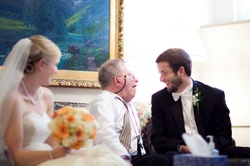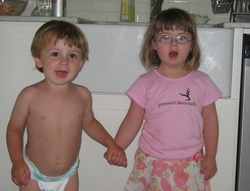Last spring, the Sunday following Easter Sunday, my beloved
mother died. The church was celebrating victory; I was living in defeat, in
despair, in death. The minister who
had come to the hospital prayed repeatedly that she would be restored to life,
that the cancer would be broken and beaten, that victory would be ours. What we
did not hear in the prayers was who God would be for us in the face of defeat.
I heard nothing of God’s fidelity to us even in death. The prayers spoke of the
strong, kingly God, of the God who breaks and beats, not of the crucified One
who was broken and beaten. The church, like the rest of our society, likes to
win. We need to win so badly that we come up with comforting aphorisms about
how losing is good, but only so you can be better suited to win next time. It’s
good to be knocked down, but only so you can find your boot-straps while you’re
on your backside and raise yourself up. What happens here is that we do not
know what to do with defeat and with its most final version, death. We learn
from our defeats but only so we can discard them and put them at arm’s length.
Yet the truth of all our lives, whether we are Christian or not, is that we
will all die.
I have a friend named Johnny. No one has made me laugh as
much in my life as Johnny has, and we only lived in the same house together for
one year. He is a fun-loving man who uses his humor to draw people together,
not to push them apart. When my mother and father came to visit us and our
housemates shortly before she was diagnosed with cancer, Johnny jumped at the
opportunity to give them a tour of the house. Johnny prayed for my parents no
less than three times during that tour. The Cuban native he is, Johnny often
carries his Spanish Bible around wherever he goes, less in order to read it,
more in order to lend a little extra authority to his own words uttered with
the good book open in front of him. Johnny is also an artist. He makes most of
his money by selling his paintings, and before my parents departed that
evening, he demanded that they take one of his paintings. Johnny lives a
vibrant life, and this offering of one of his precious gifts was just one of
his many gestures of self-giving love.
I saw Johnny three months after my mother made her passage
from life to death. In our phone conversations while my mom was sick, he would
answer the phone and immediately ask how she was. And after she died, his first
words on the phone were always “How is your dad?” Johnny carried my family with
him at all times.
I have wonderful friends. I really do, but most of them were
scared. When you talk with someone about their mother dying, they are likely to
cry. And when you talk about someone else’s mother dying, you realize that your
mother could die–that she will die. You then remember that you, too, like all
of the people who have ever lived before you, will die. When we have spent so
much of our lives putting defeat and death at a safe distance, at least an
arm’s length away, it nearly kills us to embrace it. A few of my friends did
hug me, and a few of them asked me about how I was doing. For that, I am
grateful.
Then there was Johnny. Though Johnny is a joyful man, he has
his hardships. He has lived most of his life close to death’s quarters. This
man who loves to pray for others has never been able to be a priest. That dream
had to die. This man who secondarily would want to be a doctor or a police
officer–anything to heal or protect other people–has seen those dreams die as
well. As a person with Fragile X and Cerebral Palsy, Johnny’s dreams have been
shattered and his bones, though they have not been battered, broken, or beaten,
do become more brittle with each passing day.
That day, three months after my mom’s death, as I walked
into Johnny’s room, he greeted me with an exuberant, “Wow, it’s Mateo!” After a
moment’s pause, he motioned with his painting hand for me to come closer. He
put his left arm around my shoulder, as is customary before he prays for
someone dear to him, and then looked up momentarily as he does when he begins
speaking with God. But then he didn’t begin his usual long-winded, though
always heart-felt prayer. After glimpsing above, he moved his face within
inches of mine, so close I could smell his afternoon snack of coffee and graham
crackers. “Mateo,” he said, “I’m sorry about your mom.”
And we wept. We wept as Jesus did when his good friend
Lazarus had died. We wept as good friends are supposed to weep when someone
they both love has died. We wept because God seemed to be weeping that this
saint of a woman had left us so soon.
Why was Johnny able to speak so directly and weep so openly
with me? He was giving me the gift that only someone who has lived so close to
death can give. He was giving me the gift that Jesus has given us all but was
showing me through this man. No doubt Johnny has shown me how to live well and
still does. But the most important gift he has ever given me is how to die
well–that before Easter Sunday, and sometimes after it as well, we must be
honest that we live in that awful Saturday, between the cross and the
resurrection. And that day is a day for crying.
Two months later I was playing golf with my dad. We paused
on the 13th tee-box to talk briefly about Mom. We stood there for
probably five minutes crying, speaking occasionally, remaining silent for the
most part. Before we went back to playing golf, Dad told me, “Above all, she
knew how to die well.” We hugged through the tears and hit our tee-shots.
Last time I went home, I saw that Johnny’s painting still
stands in our living room. There is no better room for that painting to
reside–in that room where we live. It might remind Dad–and I know it reminds
me–that we, like Johnny, like Mom, are called to die well.
To read all the entries in the series, type “Perfectly Human” into the search box in the upper right.


